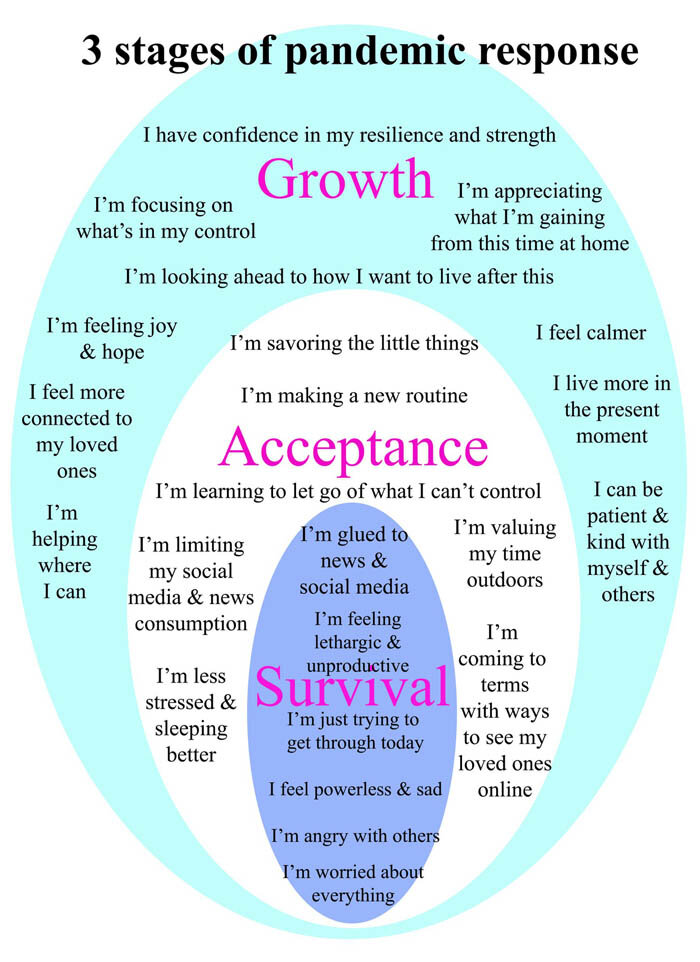Thanks to Beth for leading DPX last Sunday in our new temporary outdoor location. She presented a chart describing the 3 stages of the Covid Pandemic Response, published by the National Institute of Mental Health. The chart is a helpful guide to recognizing the difference between growth, acceptance and basic survival modes. Beth explained that, in an atmosphere of uncertainty and dread we often max out our good and bad coping skills and mechanisms. This can result in agoraphobia or feeling overly sensitive around people. It is important to understand that you may be dipping in and out of the different areas shown on the chart daily or even hourly because our thoughts and moods are impermanent.
Beth led us in a forgiveness meditation, using the phrases, “Forgive me, I forgive you, I forgive myself” as an anchor to return to when we get lost in thoughts. The meditation generated a discussion about forgiveness. Many commenting that self-forgiveness is the hardest part. People talked about having deep neural pathways of self-criticism. One member revealed that her mind is constantly reviewing previous social situation, trying to discern if she is at fault in any way. This is followed by a process of absolving her guilt. Though seeing her patterns and labeling them “reviewing” while meditating, she has come to realize that it is not her voice criticizing and judging herself, but an old conditioned “part” of her. (to use a term from the Internal Family Systems model of psychotherapy) This “part” was conditioned by her mother’s constant criticism and is no longer useful or helpful. With meditation one gets bored with all these unnecessary and unhelpful “parts” that continue to arise in a predictable pattern. Eventually it becomes easier to ignore them or drop them completely. Another helpful tip to reducing self-blame and unnecessary judgement mentioned was finding the inner child. How would you treat a child? Learn to treat yourself with the same kindness you would treat that child.
Others acknowledge they have trouble forgiving others. Beth quoted Noah Levin saying “You need to forgive everybody. I forgive you in my heart but never again in my house.” Practicing conditional forgiveness by separating internal forgiveness from external forgiveness is helpful. Rob commentated that the irony of anger is, “that you are so angry at a person, you are walking around with a rock in your gut.... and the other person is sitting at a bar having a beer!”
Rob also reminded us that some things are biological. People can have genetic dispositions which make them biologically more sensitive to certain things. The same situation can affect people differently. This explains why some people are strong and resilient in horribly adverse conditions while others end up with symptoms of trauma. Importantly, Beth commented that judging yourself against these strong people can be “just another way to beat yourself up.”
When the conversation turned back to coping mechanisms, people talked about Facebook and Instagram being a helpful way to stay connected with friends. Joining self-help groups, groups around Corona Virus issues of loss of jobs, how to navigate benefits and groups with similar interests can help you feel like you are not alone and provide useful information. However, Facebook’s algorithms can lead to confirmation bias which can be dangerous with politics, and Facebook can be addictive and overused. But Sam reminded us that “it’s better than nothing”. Mike talked about “letting go of the need to understand everything” and “letting go of expectations… of needing to have results,” and even of “having to feel better.” The level of anxiety is not going to stay. Just let it happen with forgiveness and it will pass.
Finally, doubt, one of the 5 Hinderances was discussed. Name it “doubt,” then add faith and action as a remedy. But what is faith? Barbara commented that “Faith is that 100-year old tree. Faith just comes. It’s not a feeling of happiness, it’s just ok-ness.” Sam concurred, remembering “Faith is the palm trees swaying back and forth in the wind, the only thing that survived the bombing of a city I lived in.” Mike concluded our discussion profoundly saying “Faith is making room for the people that come behind us.”



